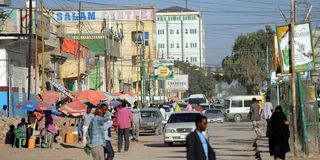In Somalia’s Las Anod, an uprising victory divides opinion

People walk in a street of Hargeisa, Somaliland on October 31, 2012.
In November 2022, months before the actual war began, a dispute emerged in Las Anod, a region straddling Somalia’s Puntland federal state and Somaliland, which has unsuccessfully tried to secede for the last 30 years.
What seemed like a local protest over perceived marginalisation has now ballooned to become a hot potato even for the federal government of Somalia to handle.
And on Friday last week, a local militia that had been leading the uprising against Somaliland forces declared victory. Known as SSC Khatumo, the uprising led by Abdulkadir Ahmed Aw-Ali Firdhiye said they had disarmed hundreds of Somaliland troops and confiscated their equipment including pick-up ‘technicals.’ According to Firdhiye, that ends the seven-month war that began proper in February, following weeks of sporadic violence.
SSC Khatumo is a loose authority formed to represent three regions of Sool, Sanaag and Cayn in northwestern Somalia. The definitive headquarters are in Las Anod.
Here, the group overran Goja’adde and Mareega military bases, killing, injuring and capturing many Somaliland soldiers.
At a press conference in Las Anod, Aw-Ali stressed on Sunday that Somaliland forces suffered loss in death and being captured, after which Somaliland forces retreated. Only a portion of captured soldiers has been shared on social media and the exact number of the captured troops has been difficult to verify.
“We seized 218 Somaliland soldiers without wounds while we also captured 42 with injuries, their total being 260,” said Firdhiye.
“The prisoners include some officers who committed crimes and all were handed over to the institutions with authority to keep them,” he added.
Yet the group also seized opportunity to seek public support. They claimed they had protected every unarmed civilian and lay any violations on the part of Somaliland.
Few may celebrate this victory beyond the actual fighters here, however. Civilians were mostly displaced, wounded or even killed. And the infrastructure, including schools and hospitals, was destroyed. Puntland state, for example, campaigned strongly against Somaliland which it accuses of oppressing the SSC because they always want to be part of a unified Somalia, contrary to Somaliland ambitions. The conflict began last year as the groups sought more autonomy. They asked to be administered directly from Mogadishu under the federal government. What followed was a storm: Somaliland troops descended on the hapless villagers, crushing anyone who dared resist. But following international condemnation, the troops withdrew. Meanwhile, the local militia reorganised themselves to a fight.
In under a year, Somaliland grip on the region was weakening. But Puntland itself may now not claim the victory. This is because the SSC want a separate federal state. For now, they want to have a special administration from the federal government, which could sort of prevent Puntland from claiming this as its own. So far, there are no definite steps on what will happen next as Somalia’s law doesn’t prescribe actual ways of creating a new federal state. There are five of this kind: Puntland, Jubbaland, Hirshabelle, South West, and Galmudug.
That may give the federal government a new headache: calming the victorious militia from the reality that a federal state may not come soon. It also adds to a continual problem: President Hassan Sheikh Mohamud and Puntland leader Said Abdullahi Deni haven’t been in good terms since last year when the latter lost the presidency to the former. If Mogadishu decided to give the uprising what they want, Puntland is likely to continue revolting. When the conflict began, President Mohamud had called for dialogue between the parties. Now the parties don’t see eye to eye.
In Somaliland, Muse Bihi, the region’s President, was on Saturday rallying his people to stay united. Promising to investigate and punish the culprits, he called on opposition leaders to support him.
He promised to pay back the SSC Khatumo clan militias.
“That (defeat) should not be perceived as totally negative since the army is still unbroken and we will revenge against the alliance that perpetrated the attack.”
“Our people are more united now, with no fear that the situation will deteriorate,” he added.
Bihi was flanked by his rival Abdurahman Mohamed Abdullahi Irro, from opposition WADANI Party during the press conference.
Somaliland had been keeping pressure on Las Anod town with its army blamed for consistently shelling the area, causing some 200,000 people to be displaced to as far as neighbouring Ethiopia. In July, some charity groups pulled out of the area, accusing combatants of targeting protected areas such as hospitals.
Yet, for now, it is unclear whether Somaliland and the clans in SSC will ever reconcile. The clan militia took up arms after elders from the Dulbahante clan that on February 6 rejected Somaliland rule and pledged allegiance to Mogadishu-based Federal Government of Somalia.
But Somaliland administration had remained steadfast in keeping the territorial integrity of the former British Somaliland Protectorate which until now had included the defiant Sool, Sanaag and Cayn regions.
Since Friday, the situation of Sool region, part of the territory disputed by Somaliland and Somalia’s Puntland State, is relatively calm.
In June, the United Nations Security Council demanded that Somaliland withdraws its forces from the disputed Las Anod town where the international body warned of a mounting humanitarian crisis.
- Additional reporting by Aggrey Mutambo





